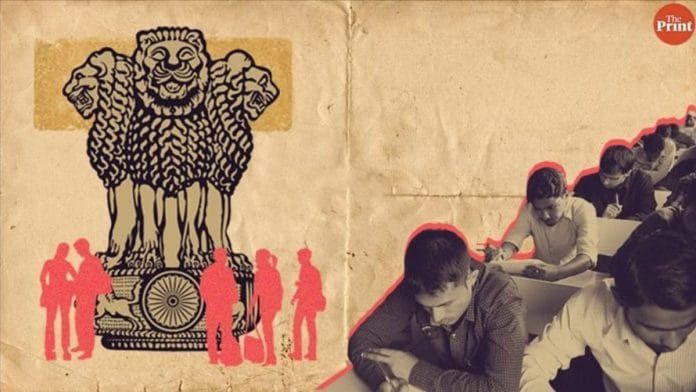New Delhi: The Department of Personnel and Training (DoPT) is assessing an internal report, which has recommended an increase in the recruitment of IAS officers from 180 a year to 210-220, ThePrint has learnt.
“There has been a longstanding need to increase the number of IAS officers, and the report has recommended that each year, 30-40 more officers are recruited by the UPSC,” a government official said on condition of anonymity.
The report was prepared by a committee consisting of officials from the DoPT and the Indian Institute of Public Administration (IIPA).
“There have been widespread vacancies in government departments at the district, state and central level,” the official said. “Since 2014 itself, about a hundred more districts have been added in India, and there is no manpower. So, the government is considering adding about 30 new IAS officers to the mix for ten years until the vacancies are filled.”
According to the latest government data, there are 1,365 vacancies in the IAS across the country. But, the number of IAS officers recruited by the UPSC has been frozen at 180 since 2012.
Responding to a question on vacancies in the IAS, then Minister of State (MoS) for the Department of Personnel & Training (DoPT) Jitendra Singh had told Parliament last year that the government is unlikely to increase the annual intake of IAS officers as any number above 180 will “compromise quality” and “lead to a distortion” in the officers’ career path.
However, given the widespread vacancies in the service, the government could now consider increasing the intake, the official quoted above said.
In addition, the government is also set to start a fresh round of recruitment at the level of deputy secretary, director and joint secretary at the centre through lateral entry, sources in the government said. A total of 51 such positions could soon be advertised.
Over the last few years, there has been a concerted effort to tackle the problem of vacancies across the All India Services (AIS). Between 2018 and 2023, for instance, the number of vacancies against which recruitment is done by the UPSC through the Civil Services Examination increased from 812 to 1143 — an increase of over 40 per cent.
While recruitment fell once in 2021 to 749 officers, the overall trend has been a gradual increase in the intake every year. In 2019, 2020, 2022 and 2023, the government advertised 927, 836, 1022 and 1,143 civil service posts, respectively.
The number of IPS officers recruited each year has gone up from 150 in 2019 to 200 officers every year since 2020.
“The decision to recruit a higher number of officers was also taken for similar reasons a few years back. There are not enough police officers in districts at the state level or at the centre,” another official said.
The number of officers recruited in the Indian Forest Service (IFoS) too has gone up marginally from a low of 24 officers in 2019 to 37 in 2023.
The other services recruited through the UPSC Civil Services Examination (CSE), include Group A (like Indian Revenue Service, Indian Postal Service and Indian Statistical Service) and Group B (Armed Forces Headquarters Civil Service and Pondicherry Civil Service) services.
Here too, there has been a broad upswing in intake from 384 advertised posts in Group A services in 2018 to 613 in 2023. Similarly, the advertised posts went up in Group B services from 68 in 2018 to 113 in 2023.
The reason why the recruitment cannot be increased exponentially at once is due to the problem of career progression, the above-quoted official explained.
“The structure of the civil services is pyramidical. If you recruit a very high number of officers, it will address the problem of vacancies at the lower levels, but they will struggle to be accommodated as they go up the ladder,” the official said.
However, there have been fluctuations in the number of recruitments each year. “It is not as though there haven’t been reductions in the last five years. In 2021, the recruitment was reduced,” the official added. “That is based on the specific number of requirements that year, but broadly, there has been an increase over the years.”
This is a reversal in trend since the first term of the Modi government when between 2014-2018, there was an almost 40 percent reduction in the recruitment of civil services and All India Services (AIS).
Also Read: 73 Prelims, 43 Mains, 8 interviews—this 47-year-old won’t stop until he is a civil servant







Present Civil Services in India is an outdated obsolete system. Indian Adminstrative Service is not needed at all since it produces generalists. Country needs professionals and experts to solve problems. IAS system not designed to solve problems. A common administrative service should be after 20 years in a professional area.
I mean a healthy, relatively low fiscal deficit IS good for the economy. Most economies in the world run with a fiscal deficit. The only ones that don’t are constrained by self-imposed boundations such as Germany.
The far important determinant here is the quality of deficit spending. Spending on productive assets such as infrastructure will only serve to give a fillip to the economy and provide greater returns than the money spent on debt financing (at least in a low interest rate or high growth environment). So not taking on that debt is tantamount to leaving money on the table. Revenue spending, on the other hand, is a different matter of course
Fiscal deficit is good for the economy, said my friend after returning from civil service exam coaching. So most civil servants also say the same thing cause they would have passed their interviews by saying so. Hope the quality of civil servants improves in future. The first step in this direction should begin by banning ‘The Hindu’ newspaper.